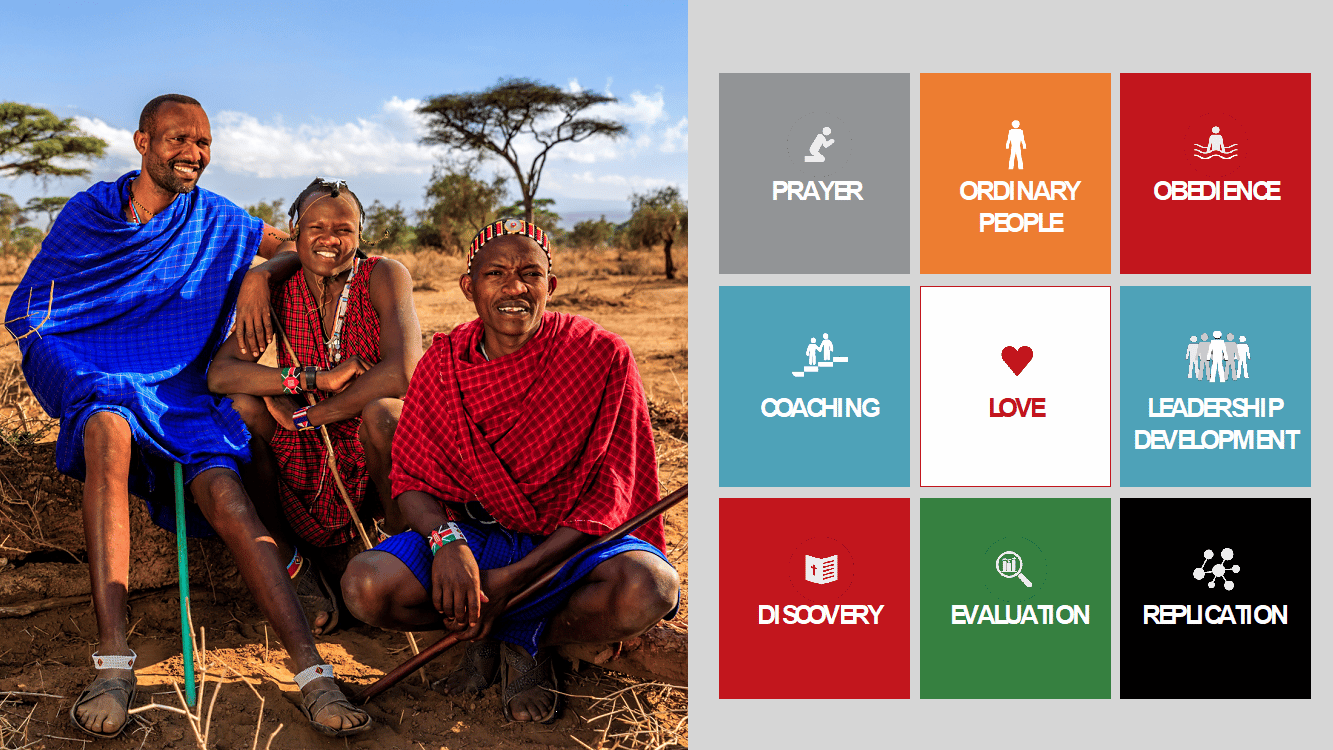
There are 1400 Disciple Making Movements around the world and they include 1% of the current world population. We will explore models that are currently being adopted in North America that utilize the principles of Disciple Making Movements. In particular, we will pursue what it means to develop churches with a combination of a traditional disciple making focus and the utilization of Disciple Making Movement principles.
An Overview of the Principles in a Disciple Making Movement in Sierra Leone – by Bobby Harrington and Harry Brown (Reactions by Jim Putman and Dan Leitz, hosted by Paul Huyghebaert)

Fasting, Prayer and the Power of the Holy Spirit in Disciple Making Movements – by Harry Brown. (Reactions by Jim Putman and Dan Leitz, hosted by Paul Huyghebaert)
What Are Discovery Bible Studies and 3-3rd Bible Studies in Disciple Making Movements? – by Harry Brown and Bobby Harrington. (Reactions by Jim Putman and Dan Leitz, hosted by Paul Huyghebaert)
DISCOVERY BIBLE STUDY
1. Gratitude: What happened last week for which you are thankful?
2. Intercession: What challenges do you see in your life? family? world?
3. Accountability: How did you obey, share and meet the need from last week’s meeting?
Read the passage. Re-read, re-tell, and consider the details.
4. He is…What do we learn about God?
5. We are…What do we learn about people?
6. I will…What has the Holy Spirit revealed to you in this passage, and how will you obey it in your life this week?
7. You can…Who do you know who needs to hear this?
8. Service…How can we help with a challenge you’re facing?
——–
THREE-THIRDS GROUP FORMAT
(ZUME.TRAINING)
LOOK BACK
1. Hope – With whom have you shared the Hope of Jesus in the last week?
2. Honor – How have you obeyed God in keeping with what you committed to do at the end of our last meeting?
Group Vision – Share a personal story, an inspiring slogan or something to encourage one another to share Jesus with others.
LOOK UP
Read, Re-read and Discuss the designated scriptures. Have the group pray that God’s Spirit would show us his next steps for us.
3. Head – What do these passages teach us about God or people?
What did you like about these passages?
What did you find difficult about these passages?
Summarize the teachings in two words _____________ ________________
4. Heart – is there anything you sense in your heart that God wants you to do in light of these passages or because of something else in your life recently? Explain?
LOOK FORWARD
Practice: In groups of two to four, practice what you have committed to do. Ask God to give you the strength to be obedient to your commitments.
5. Hands – How will you obey God with what you sense in your heart and/or share the hope of Jesus this week?
6. Help – How can we help you to do what you have committed to do this week?
Barriers to Disciple Making Movement Principles in North America – by Harry Brown. (Reactions by Bobby Harrington, Jim Putman and Paul Huyghebaert)
A Hybrid Attractional-DMM Model Church? – by Paul Huyghebaert and Bobby Harrington. (Reactions by Harry Brown, Jim Putman and Dan Leitz)
I. Why The Hybrid Attractional-DMM Model?
- Attractional churches are full of church members who need Disciple Making Movement principles to become true disciples of Jesus.
- Attractional churches are full of persons of peace – they can help us reach lots of lost people.
- Attractional churches have abundant resources for good works in the world that micro or house church lack.
- Attractional churches are full of people God wants us to love, not abandon.
- God maybe calling many of us to lead attractional churches as faithful leaders seeking revival.
II. Five Leadership Shifts – DiscipleShifts (modified from the book by Putman/Harrington, DiscipleShift)
From Reaching to Making
(from focusing on converts to focusing on true disciples)
From Informing to Equipping
(from focusing on informing/inspiring to equipping to be and make disciples)
From Program to Purpose
(from focusing on the programs of the church to making disciples in the church)
From Activity to Relationship
(from lots of church activities to a focus on relational groups for disciple making)
From Accumulating to Deploying
(from a focus on accumulating bodies, bucks, buildings to deploying disciple making disciples)
*See Relational Discipleship Network, Bonhoeffer Project, Replicate, and DiscipleFirst organizations involved with DISCIPLESHIP.ORG for examples of networks seeking to emphasis these points.
III. Five Attractional Anchors that Remain
- The church is known in the community because it serves the community.
- The church has buildings and an established presence.
- The church attracts people to weekend gatherings.
- The church has a centralized leadership focused upon creating a culture with DMM principles like Fasting, Fishing (intentionally focused on lost people), and Forming (obedience based disciple making).
- The church directs people from weekend gathering into DMM style groups with 75% involved.
IV. A 10 Point Picture of Hybrid Attractional-DMM Church
- The mission is clear all the time – reaching lost people, being disciples and making disciples.
- Radical Dependance of the Holy Spirit – in-depth fasting and prayer empowers the mission.
- Disciple making is the culture – it is the underlying cultural identity of the church – reflecting the lived reality of the church’s values, actions, and words.
- Disciple making is the filter – this means very decision made and every dollar spent passes through the filter: how does this help us reach and make disciples?
- Leaders/staff make and coach disciple makers – the core leadership focus is not on making disciples, but on making disciple-makers.
- Disciple making expectations are high – There is a joyful expectation that every member is committed to being a disciple and becoming a disciple-maker- 20-25% of adult lay leaders are personally engaged in making disciples (or apprenticeship roles).
- Scripture is the curriculum
- Intentionality prevails in a simple, effective, and reproducible system.
- Stories of disciple making – the core leaders of the church hear stories on a weekly basis of formerly lost people who not only came to faith in Jesus, but they are now actively making disciples.
- Disciples who make disciples, who make disciples, who plant churches – the disciple-making activities of the church result in planting new churches every year or two.
